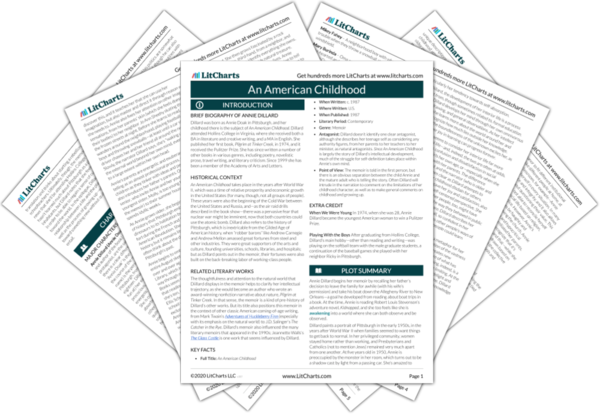Even if the real drama of Annie’s growing up takes place within her own mind, most of her external drama has to do with her relationship to authority. Annie’s curiosity means that she’s a uniquely self-propelled child, but the flip side of her independence is that the institutions and authority figures that lend structure to her childhood irritate her and become sources of tension between her own desires and her institutional obligations.
This tension begins in the home as teenaged Annie feels rage and frustration at requirements as simple as having to sit down for breakfast with her parents. Family is a source of love and nurturing attention in the memoir, but while Dillard makes clear that she loves and admires her family, she is also honest about the ways in which she chafed against even this relatively benign “institution.” It’s possible, too, that Annie had a model for rebelling against her family; as the tension between Oma and Mother makes clear, families are prone to power struggles, and even good, respectful people can find themselves part of one.
Church and school are the two other major institutions that structure Annie’s childhood and adolescence, and she finds herself deeply at odds with both. While her friends can shift their behavior and demeanor to fit different institutional contexts—they can seem like different people at home, at dancing school, and in the classroom, for example—Annie struggles to be anything but herself in every situation. In many ways, this is a sign of confidence and integrity, and it also allows Annie not to accept norms without questioning their value. This means, for example, that Annie is not able to reconcile herself to the segregation of Pittsburgh social life based on religion, and she bristles at any hint of prejudice. However, Annie’s struggle with authority can sometimes be haughty and arrogant. By writing a formal letter leaving the church, Annie rebels against what she sees as a stifling and hypocritical institution, only to realize that she has humiliated her parents. As she grows up, though, Annie begins to recognize that it’s impossible to run away from all institutions, and that—while she can and should object to distinctions that are drawn based on prejudice—there can also be a certain power to the collective knowledge and authority of institutions like schools and churches.
Family, Authority, and Institutions ThemeTracker

Family, Authority, and Institutions Quotes in An American Childhood
They must have known, those little boys, that they would inherit corporate Pittsburgh, as indeed they have. They must have known that it was theirs by rights as boys, a real world, about which they had best start becoming informed. And they must have known, too, as Pittsburgh Presbyterian boys, that they could only just barely steal a few hours now, a few years now, to kid around, to dribble basketballs and explode firecrackers, before they were due to make a down payment on a suitable house.
I had essentially been handed my own life. In subsequent years my parents would praise my drawings and poems, and supply me with books, art supplies, and sports equipment, and listen to my troubles and enthusiasms, and supervise my hours, and discuss and inform, but they would not get involved with my detective work, nor hear about my reading, nor inquire about my homework or term papers or exams, nor visit the salamanders I caught, nor listen to me play the piano, nor attend my field hockey games, nor fuss over my insect collection with me, or my poetry collection or stamp collection or rock collection. My days and nights were my own to plan and fill.
I left Pittsburgh before I had a grain of sense. Who IS my neighbor? I never learned what those strangers around me had known and felt in their lives—those lithe, sarcastic boys in the balcony, those expensive men and women in the pews below—but it was more than I knew, after all.
I was growing and thinning, as if pulled. I was getting angry, as if pushed. I morally disapproved most things in North America, and blamed my innocent parents for them. My feelings deepened and lingered. The swift moods of early childhood—each formed by and suited to its occasion—vanished. Now feelings lasted so long they left stains. They arose from nowhere, like winds or waves, and battered at me or engulfed me.
It galled me that adults, as a class, approved the writing and memorization of poetry. Wasn’t poetry secret and subversive?











